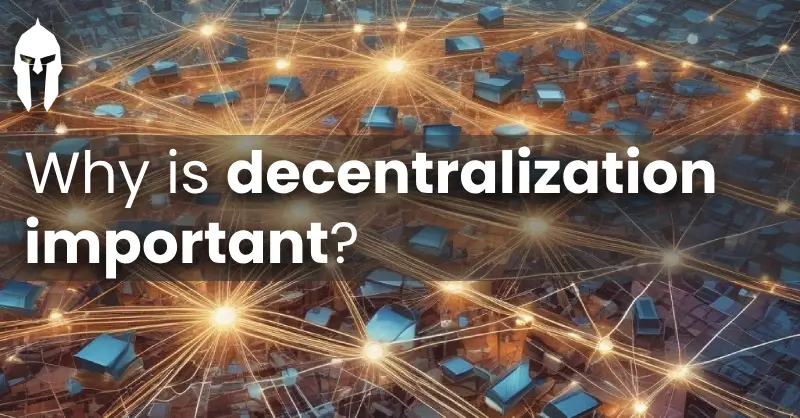
Why is decentralization important?
June 24, 2024
One of the most discussed topics in the blockchain and cryptocurrency industry is centralization vs. decentralization. Every blockchain project strive to achieve as must decentralization as possible to avoid single points of failures and centralization of authority. But what does it mean, decentralization, and why is decentralization important? These are the questions we need to answer and therefore, we have conducted a list of factors to help clarify what it means and why it is important.
Decentralization is important for several reasons:
1. Increased security : Decentralized systems are often more secure because they don't rely on a single point of failure or a small group of individuals controlling the system. In a decentralized system, data is distributed across multiple nodes or participants, making it more difficult for a single entity to manipulate or disrupt the system.
2. Reduced risk of censorship : Decentralized systems are less susceptible to censorship because there is no central authority controlling the flow of information. This means that users can access the information they need without fear of censorship or restrictions.
3. Greater transparency : Decentralized systems often provide greater transparency because data is openly accessible and verifiable by all participants. This makes it easier for users to identify and correct any errors or inconsistencies in the system.
4. Increased privacy : Decentralized systems can provide greater privacy because users can maintain their anonymity and control over their data. This is especially important for individuals who may be concerned about the privacy of their personal information.
5. Improved scalability : Decentralized systems can be more scalable because they are not limited by the capabilities of a single entity. As the system grows, new participants can easily join and contribute to the network, making it more robust and scalable.
6. Reduced centralization of power : Decentralized systems help to reduce the concentration of power in the hands of a few individuals or organizations. This is especially important in fields like finance, politics, and technology, where centralization of power can lead to abuse and corruption.
7. Increased innovation : Decentralized systems can foster innovation because they provide a level playing field for participants to experiment and develop new ideas without the need for approval from a central authority.
8. More democratic : Decentralized systems can be more democratic because they provide a platform for all participants to have a voice and contribute to the decision-making process.
9. Reduced costs : Decentralized systems can be more cost-effective because they eliminate the need for intermediaries or middlemen, reducing transaction costs and increasing efficiency.
10. Resilience : Decentralized systems are often more resilient because they can continue to function even if some parts of the system fail or are attacked. This makes them more reliable and less susceptible to disruptions.
Summary
In summary, decentralization is important because it promotes security, transparency, privacy, scalability, innovation, democracy, and resilience, while reducing the risk of censorship, centralization of power, and cost.
At Myrmidon Staking, we are all about decentralization of staking, providing our customers with the best solutions to achieve the highest rewards while maintaining a high level of security, transparency and privacy at a low cost. Start staking today to earn passive income on your investment.